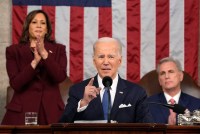Latest KFF Health News Stories
California eligió a la compañía de genéricos Civica para producir insulina de bajo costo
Civica está desarrollando tres tipos de insulina genérica, conocida como biosimilar, que estarán disponibles tanto en viales como en plumas inyectables, a un costo de entre $30 y $55.
La insulina representa lo perverso del sistema sanitario estadounidense, ya que los precios de venta de este medicamento centenario, del que dependen 8,4 millones de estadounidenses para sobrevivir, se quintuplicaron en dos décadas.
Why Does Insulin Cost So Much? Big Pharma Isn’t the Only Player Driving Prices
Big Pharma may be moving on from squeezing diabetes patients on insulin prices, but it’s the arbitrators that jack up prices for those who can least afford them.
Decisión de Eli Lilly de bajar el precio de su insulina logrará cambios históricos en los costos
Expertos en precios de medicamentos celebraron la noticia de Eli Lilly y otros esfuerzos. Y estas otras iniciativas para llevar al mercado insulina de menor costo, a su vez, presionarían a Eli Lilly para que mantuviera sus precios bajos.
What the Health? From KFF Health News: March Medicaid Madness
President Joe Biden and Republicans in Congress spent last month sparring over whether to shield Medicare and Social Security from budget cuts — leading some to wonder if Medicaid was on the table instead. Biden and Democrats say no, but some Republicans seem eager to trim federal spending on the health program for Americans with low incomes. And ready or not, artificial intelligence is coming to medical care. Benefits, as well as unintended consequences, are likely. Alice Miranda Ollstein of Politico, Rachel Cohrs of STAT News, and Lauren Weber of The Washington Post join KHN’s chief Washington correspondent, Julie Rovner, to discuss these issues and more.
Eli Lilly Slashed Insulin Prices. This Starts a Race to the Bottom.
Eli Lilly’s news that it plans to cut insulin costs for patients will help, not hinder, the recent efforts in California and by entrepreneurs such as Mark Cuban to offer lower-cost alternatives, drug pricing experts said.
California’s Massive Medicaid Program Works for Some, but Fails Many Others
Medi-Cal serves more than one-third of the state’s population — offering a dizzying range of care to a diverse population. In the new “Faces of Medi-Cal” series, California Healthline will assess the program’s strengths and weaknesses through the lives and experiences of its enrollees.
After Capping Insulin Copays, Colorado Sets Its Sights on EpiPens
Colorado’s proposed legislation to cap the copay for the EpiPen is part of a nationwide trend as more states try to shield patients from skyrocketing drug prices.
A Bitter Battle Over the ‘Orphan Drug’ Program Leaves Patients’ Pocketbooks at Risk
Patients who depend upon special drugs to treat rare diseases are caught in the crossfire as drugmakers and the FDA battle over regulations that reward companies for developing treatments for relatively small pools of patients.
Mark Cuban Has Been Taking On the Drug Industry. But Which One?
The billionaire entrepreneur and NBA team owner is making waves with his new drug company. But his generics aren’t always the lowest-priced deal.
What the Health? From KFF Health News: The Kids Are Not OK
A new survey from the Centers for Disease Control and Prevention finds that teenagers, particularly girls, are reporting all-time high rates of violence and profound mental distress. Meanwhile, both sides in the abortion debate are anxiously waiting for a district court decision in Texas that could effectively revoke the FDA’s 22-year-old approval of the abortion pill mifepristone. Alice Miranda Ollstein of Politico, Sandhya Raman of CQ Roll Call, and Joanne Kenen of the Johns Hopkins Bloomberg School of Public Health and Politico join KHN’s chief Washington correspondent, Julie Rovner, to discuss these issues and more.
When Medicare stops paying for a pricey drug that prolongs life, an Ohio man considers giving up treatment to spare his family enormous debt.
What the Health? From KFF Health News: A Health-Heavy State of the Union
President Joe Biden’s 2023 State of the Union address leaned heavily on health care issues. Biden took a victory lap for recent accomplishments like capping prescription drug costs for seniors on Medicare. He also urged Congress to make permanent the boosted premium subsidies under the Affordable Care Act, and he sparred with Republicans on threats to cut Social Security and Medicare. Also this week, both sides in the abortion debate are bracing for a court decision out of Texas that could, at least temporarily, make the abortion pill mifepristone illegal nationwide. Alice Miranda Ollstein of Politico, Rachel Cohrs of Stat, and Sarah Karlin-Smith of the Pink Sheet join KHN chief Washington correspondent Julie Rovner to discuss these issues and more. Also this week, Rovner interviews Kate Baicker of the University of Chicago about a possible middle ground in the effort to get universal health insurance coverage.
Centene Agrees to $215 Million Settlement With California for Alleged Medicaid Overbilling
The nation’s largest Medicaid insurer denies wrongdoing after the California attorney general’s office investigated it for inflating prescription drug costs.
Políticas de salud fueron tema prominente en el discurso del Estado de la Unión de Biden
A diferencia de sus discursos anteriores, éste fue a Cámara llena, y sin limitaciones por covid-19. Y los legisladores en la audiencia, tanto partidarios como opositores, parecían estar de un humor estridente.
Health Policies Were a Prominent Theme in Biden’s State of the Union Speech
Our partners at PolitiFact fact-checked a range of President Joe Biden’s statements, including key health-related comments.
‘We Ain’t Gonna Get It’: Why Bernie Sanders Says His ‘Medicare for All’ Dream Must Wait
As he takes the reins of the Senate Health, Education, Labor & Pensions Committee, the independent from Vermont and implacable champion of “Medicare for All” maps out his strategy for negotiating with Republicans — and Big Pharma.
The Biggest, Buzziest Conference for Health Care Investors Convenes Amid Fears the Bubble Will Burst
This year’s JPMorgan confab, the first since covid’s chilling effect on such gatherings, was full of energy and enthusiasm. But it was also marked by questions about the future of health care investment.
California Attorney General Sues Drugmakers Over Inflated Insulin Prices
California Attorney General Rob Bonta is taking three major drugmakers and three distributors to court, alleging the companies illegally raised prices at the expense of diabetes patients.
Fiscal general de California demanda a farmacéuticas por “inflar” los precios de la insulina
En la demanda, Rob Bonta argumentó que los precios se han disparado y que algunos pacientes se han visto obligados a racionar sus medicamentos o renunciar por completo a comprar insulina.




















